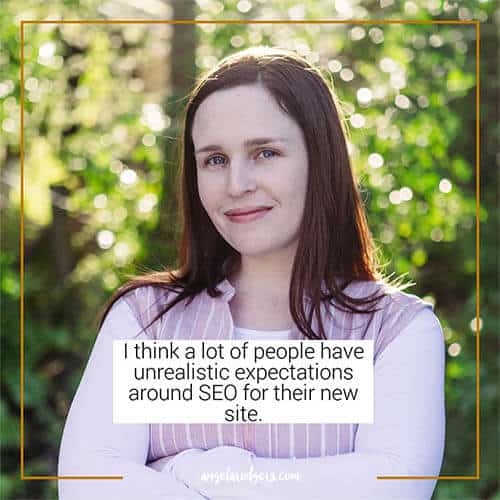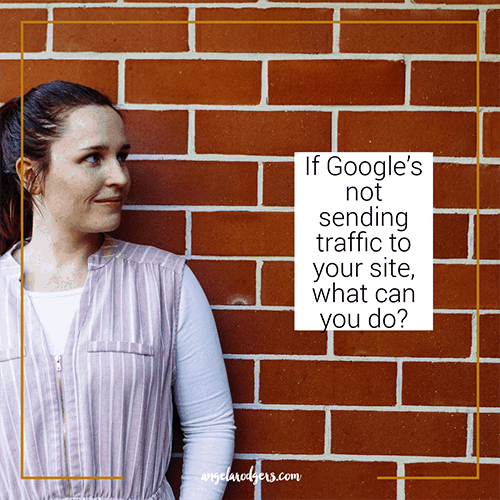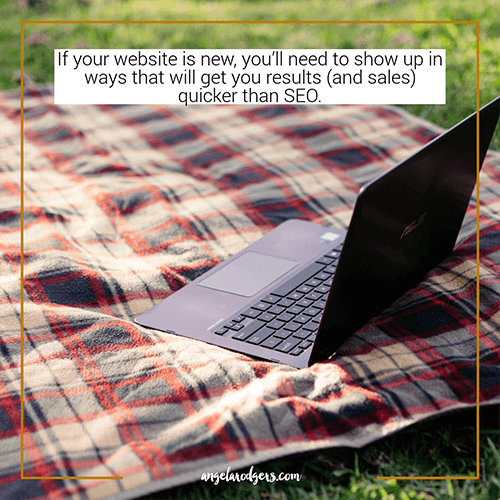A few months ago, I was talking to a lovely group of people about SEO and websites. It was great because it helped me see SEO from a fresh perspective – from business owners who aren’t dealing with it every single day. In fact, some of these people didn’t even know what SEO stands for.
I’d hate to make the assumption, so allow me a quick definition and some basics.

SEO = search engine optimisation. It refers to the activities you can do to help your website show up in Google for the search terms you want to rank for (yes, there are other search engines, but let’s just keep it simple and focus on Google).
The ultimate SEO goal is to rank on page 1 (ideally position 1!) for searches that:
- Get a high volume (lots of people searching)
- Are highly relevant (more likely to come from your ideal customer/client)
- Have high commercial intent (are more likely to lead to a sale or enquiry)
The thing is, SEO can be confusing and overwhelming. Especially when you’re new to it. Almost everyone says you should be doing it, but what exactly are you meant to do, anyway? And what results can you expect when you’ve got a relatively fresh, new website?
Time for some real talk, because I think a lot of people have unrealistic expectations around SEO for their new site.

Realistic SEO for new websites
This is a generalisation, of course. But in my experience…
- Your brand new website won’t generate you inbound leads (aka traffic and enquiries) on its own via Google
- Not for ages
- And maybe never unless you put some effort in (unless you’re a well known brand that lots of other sites trust and link out to)
- SEO is a very long-term thing and I’m only just starting to see results myself (thanks to spending some time optimising for specific keywords, getting a handful of links, and making sure I know my stuff via The Recipe for Success SEO course)
But it’s not all doom and gloom. You should still have a website and work on your SEO if showing up in Google is part of your medium-long term strategy.
Because in the meantime, your website can still help you convert your leads. If you put the right stuff on your site, like engaging info about you, proof, useful resources, and so on… if the right people end up on your site, they will enquire. Trust me, it works 😉
So if Google’s not sending traffic to your site, what can you do?

How to get people to your website without Google
You’ll need to generate leads from other channels. Go to the social networking platforms your clients hang out on. Connect (in person or online) with your ideal clients. Make them curious about you.
Put your url in all the places. LinkedIn, Facebook, Instagram, Twitter, business cards, forum posts, online directories, signage… do what you gotta do!
People will go look at your site if they’re curious. Then you just have to convert them (no biggie).
How to convert website visitors
Conversion is all about making sure at least some of the people who end up on your site stay there for long enough to opt in, enquire, or buy. They “convert” from visitor to lead or customer.
So, how do you convert people? Lots of different elements add up to improve conversion:
- Make sure the right people come to your site in the first place
- Have good content
- Be yourself
- Talk to your ideal audience
- Make it easy for them to find what they’re looking for
- Don’t overwhelm them with information
- Create a UX that’s intuitive and predictable (no crazy navigation, please)
- Make it easy for them to contact you – have lots of options
If the timing and your offer is right and you make it easy for them to say yes, they will.
Work with what you’ve got now, but think long-term
One day, your website will generate leads on its own via Google if you stick at it long enough (and put the work in). It’s worth thinking long-term because the work you put in now can provide an ROI over and over again (unlike paid advertising where you have to keep paying for the click). Plus, it’s much less effort when your clients come to you through your site.
Here’s how you can think long-term with your SEO:
- Work on your content (optimising your pages and creating quality blogs)
- Work on getting your site technically sound
- Work on building relationships online and getting good backlinks
If you do these things, SEO will eventually happen for you. It might only take a few months, or it might take years before you start to see results – it all depends on how much effort you put in and whether your competitors are also working on their SEO.
Don’t forget about other marketing tactics

Meanwhile, don’t put all your eggs in the SEO basket.
You need to spread yourself across other marketing channels and tactics, too. If your website is new, you’ll need to show up in ways that will get you results (and sales) quicker than SEO. After all, you need sales to stay in business. If you rely 100% on SEO, you might just go out of business before you make your first sale!
So think long term, but don’t forget the short term too!
What if I have an older website?
Your website should be generating you leads via Google if you’ve been doing all the right things for a few years or more. If it’s not, maybe do an audit to see what’s holding it back and if anything could be tweaked to help you see better results.
And in the meantime, keep driving traffic to your site through other methods. Because even if Google becomes your main source of traffic and sales, you should always have other marketing channels on the go. This will minimise your exposure to risk in case Google suddenly changes something that impacts your rankings (rare if you’re doing the right thing, but also not unheard of).
Over to you…
I’d love to know if your experience with new websites and SEO has been similar to mine. When did you start to get organic traffic and enquiries via Google? Please feel free to share your experience in the comments below.
Or ask me a specific question about SEO for your website and I’ll do my best to answer it.
🙂 Angela
P.S. While I want this post to be super realistic, it’s also not all doom and gloom. SEO is pretty amazing – and exciting when you get total strangers enquiring via your website (without paying for ads!). I’ve only done about ¼ of the SEO things on my to-do list for my own site (because #time) and I’m already ranking in top positions for some of my target phrases. I saw results within a couple of months of being really strategic with my SEO. So if you want to do it, DO IT!



2 comments
Karenna Reidy
Very helpful! Thanks:-)
Angela Rodgers
You’re most welcome, Karenna! All the best with your gorgeous new website 🙂